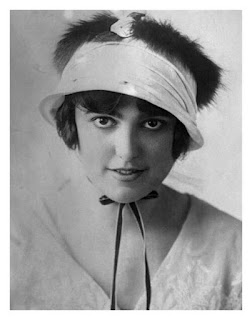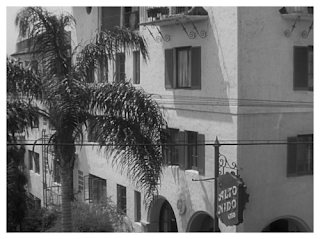At his birth, Roscoe Arbuckle weighed 16 pounds — a very big boy. Always chubby, he was taunted at school as "Fatty", and the name stuck.
His father doubted the boy's paternity, beat him frequently, and eventually abandoned the family. From my few hours research, it seems young Roscoe had a miserable childhood, then rescued himself when he discovered he could make people laugh. That's not an uncommon story, for funny folks.
 |
| Fatty Arbuckle |
One of their first films together, A Noise from the Deep, has the first pie in the face in motion picture history — Normand pushing, Arbuckle receiving.
Often working with his buddy Buster Keaton, Arbuckle's star rose, and by 1920 he was Hollywood's highest-paid performer, signing a million-dollar-a-year contract with Paramount. Adjusted for inflation, that's about $15,000,000 in 2023 money.
But then, Arbuckle did something I'd never do: He accepted an invitation to a party.
♦ ♦ ♦
His friend Fred Hibbard had rented several adjoining suites at San Francisco's super-swanky St Francis Hotel, on the city's Union Square, for a Labor Day weekend of debauchery. A great deal of then-illegal alcoholic beverages were consumed, over three days and nights of partying.
What happened at about 3:00 PM on Monday, September 5, 1921, is still subject to debate and exaggeration.
 |
| Virginia Rappe |
Arbuckle said he stepped into one of the bedrooms to change from his party pajamas into his clothes, and found Virginia Rappe in the room. She was, he said, a long-time acquaintance, who seemed weak and sick, vomiting in the bathroom, so he helped her onto the bed.
Or, Arbuckle pulled Rappe into the room, saying, "I've waited for you five years, and now I’ve got you," then locked the door. That's what another guest at the party, Maude Delmont, said. Some time later she heard Rappe scream, she said, and after much pounding, Arbuckle opened the door.
Arbuckle and Delmont agreed that Rappe was on the bed, moaning, and that she said, "I am dying, I am dying." In Delmont's version, Rappe also said, "He did it."
With help from Hibbard the host, Arbuckle carried Rappe to a more secluded room, and called the hotel manager, asking him to send a doctor. When the doctor came, he decided Rappe was merely intoxicated (then as now, doctors didn't tend to listen closely to women's complaints of pain).
Arbuckle later said he'd had no inkling that Rappe's pain would prove fatal. He left the hotel, she died of a ruptured bladder several days later, and Arbuckle was charged with manslaughter.
The case was covered in gruesome detail with lurid innuendo, newspapers claiming that the inebriated movie star had ravaged a sweet, innocent girl. It was whispered that Arbuckle had crushed Rappe with his weight while raping her, or crammed a Coca-Cola bottle or ice cubes up her vagina, thereby rupturing her bladder and killing her.
The man who had rivaled Charlie Chaplin as America's most popular comic was soon held in disdain, widely believed to be guilty. Paramount Pictures suspended his contract, and his films were withdrawn from circulation.
♦ ♦ ♦
Arbuckle faced trial thrice, and maintained that he had acted responsibly, that Delmont had approached him for hush money after Rappe's death, and that she had only gone to police after he had refused to pay.
Rappe's bladder was brought into the courtroom and introduced as evidence, and physicians testified that its damage was not caused by any external object or force.
Delmont testified against Arbuckle at the first trial, but her account of what happened was at odds with the statements of others at the party, and also at odds with her first statements to police. Instead of Arbuckle dragging Rappe into the bedroom, she testified that Rappe had gone in alone, to use the toilet. After telling reporters she and Rappe had been friends for an "intimacy of years," at trial she said they'd known each other for about a week.
There were also rumors, probably planted by Arbuckle's defense, that Delmont had worked as a 'madam', and had been charged with blackmail some years earlier. Both claims seem unverifiable, and not much is known about Delmont. She was a heavy drinker and a party girl, and she reportedly peppered her speech with vulgarities, even during her courtroom testimony. This doesn't mean she was lying, but it made her less than the best witness on the stand.
The trial ended with a hung jury, as did a second trial. In the second and third trials, Delmont was not called to testify.
At the third trial, jurors deliberated for six minutes before finding Arbuckle not guilty, and apparently spent most of that time composing and unanimously signing a rebuke to prosecutors:
"Acquittal is not enough for Roscoe Arbuckle. We feel that a great injustice has been done him. We feel also that it was only our plain duty to give him this exoneration, under the evidence, for there was not the slightest proof adduced to connect him in any way with the commission of a crime. …
"Roscoe Arbuckle is entirely innocent and free from all blame."
That part of the jury's note appears in most articles about the Fatty and Rappe matter, and usually with the same ellipsis in the same place. The rest of the jury's note, as written and without dot-dot-dot, was:
"He was manly throughout the case, and told a straightforward story on the witness stand, which we all believed.
"The happening at the hotel was an unfortunate affair for which Arbuckle, so the evidence shows, was in no way responsible.
"We wish him success.…
Which sounds more like a Fatty Arbuckle Fan Club than a jury outraged at a miscarriage of justice.
♦ ♦ ♦
Despite his exoneration, studios, theaters, and moviegoers did not clamor for more of Arbuckle's comedy.
He worked behind the camera, writing and directing under the assumed name William B. Goodrich. After ten years he made an on-screen comeback, starring in 1932's Hey, Pop! and several other shorts, which were lukewarmly received. He died of a heart attack in 1933.
 |
| Alto Nido Apartments |
In our time, Arbuckle's name — if remembered at all — comes up more often in the context of "getting away with murder" than being a funny guy.
So, did Fatty Arbuckle kill Virginia Rappe? If you believe in the American system of justice, "there was not the slightest proof" of it.
The American system of justice also decided that Dred Scott wasn't a US citizen, that Nicola Sacco and Bartolomeo Vanzetti were guilty of murder, and that women have no right to control their uteri, so who can say with certainty what awful thing happened one afternoon all those years ago?
10/13/2023

johnthebasket
ReplyDeleteFine writing of a compelling story. I've seen many references to Arbuckle over the years, but never a concise, reasonably objective piece like this. I write a little, and I can tell how incredibly well edited this story is. Telling a complex story of a historical event and including the nuance you did is the job of a seasoned, professional writer. Today that was you.
Your use of language is notable. It's fairly informal, although the story is pretty complicated. Again, the work of a pro. This is the point in the text where I'd suggest improvements. There aren't any.
Superb, professional job of research and writing.
John
Appreciated, Dr John.
DeleteThis one I thought would only interest me, so again, what do I know?